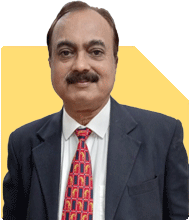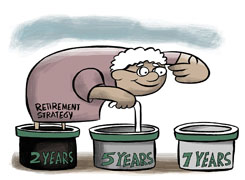My age is 59. I am retiring soon. I will get a pension of around 40,000/- per month. I will get a total corpse of around 90 Lakh from the employer. My present monthly expenditure is around 50,000/-.
How can this fund be managed to survive in a better way in the future?
Ans: At 59 years old, retirement is just around the corner for you. You will receive a pension of Rs. 40,000 per month and a lump sum of Rs. 90 lakhs from your employer. Your current monthly expenditure is Rs. 50,000. The goal is to manage these funds efficiently to ensure a comfortable and secure retirement.
Investment Objective
You aim to invest a lump sum to build a corpus of Rs. 5 crores over 10 years. This is an ambitious yet achievable goal. It requires careful planning and strategic investments.
Advantages of Actively Managed Funds
Actively managed funds can potentially deliver higher returns. The fund manager actively selects stocks to outperform the market. This is crucial for achieving your investment goals.
ICICI Funds: A Reliable Choice
ICICI Mutual Funds are known for their robust performance and strong track record. They offer a variety of schemes suitable for long-term investment. Their expertise and active management can help achieve your corpus goal.
How Much to Invest?
To reach a corpus of Rs. 5 crores in 10 years, a substantial initial investment is needed. This depends on the expected rate of return. Historically, actively managed equity funds have delivered 12-15% annual returns.
Diversifying Your Portfolio
Diversification is key to managing risk and enhancing returns. Investing in a mix of large-cap, mid-cap, and sectoral funds can provide a balanced portfolio. ICICI offers a range of funds across these categories.
Large-Cap Funds
Large-cap funds invest in established companies with stable performance. They offer relatively lower risk and steady returns. This should form a core part of your portfolio.
Mid-Cap Funds
Mid-cap funds invest in medium-sized companies with high growth potential. These funds can deliver higher returns, albeit with higher risk. Including mid-cap funds can enhance your portfolio's growth prospects.
Sectoral and Thematic Funds
Sectoral funds focus on specific industries like technology, healthcare, or finance. Thematic funds invest based on themes like consumption or innovation. These funds can provide high returns if the sector or theme performs well.
Benefits of Regular Funds Through a Certified Financial Planner
Investing through a Certified Financial Planner (CFP) ensures professional guidance. Regular funds come with expert advice, helping you navigate market complexities. This personalized approach can optimize your investment strategy.
Importance of Asset Allocation
Proper asset allocation balances risk and return. A mix of equity and debt investments is essential. While equity funds drive growth, debt funds provide stability and income.
Role of Debt Funds
Debt funds invest in fixed-income securities like bonds and treasury bills. They offer stable returns and lower risk. Including debt funds can safeguard your portfolio during market volatility.
Systematic Withdrawal Plan (SWP)
An SWP allows you to withdraw a fixed amount regularly from your investment. This can supplement your pension and cover monthly expenses. It ensures a steady cash flow without depleting your capital.
Emergency Fund
Maintain an emergency fund equivalent to 6-12 months of expenses. This provides a financial cushion for unexpected situations. It should be invested in liquid or short-term debt funds for easy access.
Tax Planning
Investments in mutual funds offer tax benefits. Long-term capital gains from equity funds are taxed at 10% above Rs. 1 lakh. Debt funds are taxed at 20% with indexation benefits. Proper tax planning can enhance your net returns.
Reviewing Your Investments
Regularly review your investment portfolio. Monitor fund performance and make adjustments as needed. This ensures your investments stay aligned with your goals.
Complementary Investments
While mutual funds are a primary investment, consider other options. Public Provident Fund (PPF) and National Pension System (NPS) offer tax benefits and secure returns. They can complement your mutual fund investments.
Managing Post-Retirement Funds
Your Rs. 90 lakh corpus should be managed to generate regular income. A mix of mutual funds, fixed deposits, and government schemes can provide stability and growth.
Fixed Deposits (FDs)
FDs offer assured returns and capital protection. They can provide a steady income stream. However, returns are generally lower than mutual funds.
Government Schemes
Senior Citizen Savings Scheme (SCSS) and Pradhan Mantri Vaya Vandana Yojana (PMVVY) offer attractive interest rates. They provide secure and regular income for retirees.
Health Insurance
Ensure adequate health insurance coverage. Medical expenses can significantly impact your finances. A comprehensive health insurance policy can protect you and your family.
Estate Planning
Plan your estate to ensure your assets are distributed as per your wishes. This includes making a will and considering other estate planning tools.
Your foresight in planning for retirement is commendable. It's wise to consider professional guidance to manage your investments effectively.
Retirement planning can be overwhelming. It's important to feel secure about your financial future. A well-structured plan can provide peace of mind and financial stability.
Final Insights
Achieving a corpus of Rs. 5 crores in 10 years is feasible with strategic planning. Investing in a diversified portfolio of ICICI mutual funds can help you reach this goal. Regular reviews and adjustments ensure your investments stay on track. Your upcoming retirement needs careful management of the Rs. 90 lakh corpus and pension. Balancing growth and income is crucial for a comfortable retirement.
Best Regards,
K. Ramalingam, MBA, CFP,
Chief Financial Planner,
www.holisticinvestment.in









